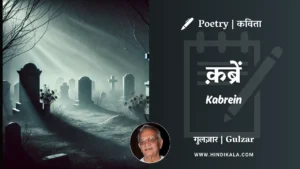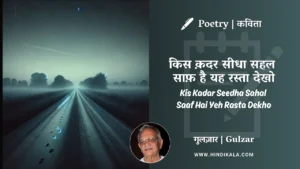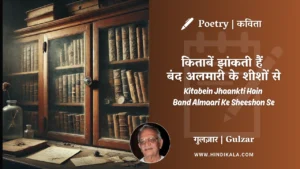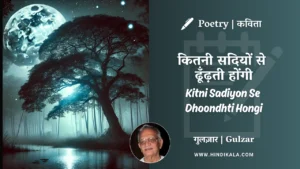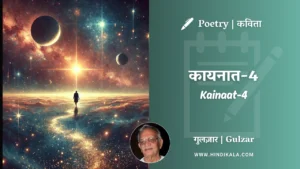Gulzar Poetry Aah in Hindi & English with Meaning (English Translation) | गुलज़ार – आह!
Hindi Kala presents Gulzar Poetry Aah about the habit of drinking poison in Hindi & English with the poem’s Meaning (English Translation).

गुलज़ार की कविता आह!
ठंडी साँसे ना पालो सीने में
लम्बी सांसों में सांप रहते हैं
ऐसे ही एक सांस ने इक बार
डस लिया था हसी क्लियोपेत्रा को
मेरे होटों पे अपने लब रखकर
फूँक दो सारी साँसों को ‘बीबा’
मुझको आदत है ज़हर पीने की
Gulzar Ki Kavita Aah! in Roman Transcript
Thandi Saansein Na Paalo Seene Mein
Lambi Saanson Mein Saanp Rehte Hain
Aise Hi Ek Saans Ne Ek Baar
Das Liya Tha Hasi Cleopatra Ko
Mere Hothon Pe Apne Lab Rakhkar
Phoonk Do Saari Saanson Ko ‘beeba’
Mujhko Aadat Hai Zeher Peene Ki
Gulzar Hindi Poetry Aah! Meaning (English Translation)
Don’t harbor cold breaths in your chest
Long breaths are home to snakes
Once, a breath like that
Bit the smiling Cleopatra
Placing your lips on mine
Blow all your breaths, ‘Biba’
I’m used to drinking poison
Essence of the Poem
This poem is a dark, sensual, and almost fatalistic exploration of love and desire.
Key Themes:
Danger in Passion: Long breaths are compared to snakes to illustrate how hazardous and even lethal passionate love can be. This view is further supported by the mention of Cleopatra’s snakebite death.
Forbidden Desire: Although “blowing all your breaths” evokes a passionate kiss, it also has connotations of a risky and illegal conduct.
Addiction to Pain: The speaker exhibits a masochistic streak in the last phrase, “I’m used to drinking poison,” which implies an obsession with suffering and peril.
Interpretation:
Intoxicating and destructive love are both depicted in the poem. Despite knowing that it could result in their demise, the speaker finds themselves captivated to a passionate and perilous love. A deep-seated fear of love and a wish to be injured are suggested by the imagery of snakes and poison.
By implying a close relationship between the speaker and the person they are addressing, the phrase “biiba” lends the poetry a sense of intimacy and familiarity. But the poem’s general tone is gloomy and ominous, suggesting a terrible conclusion.
You Might Also Like
Tags:

